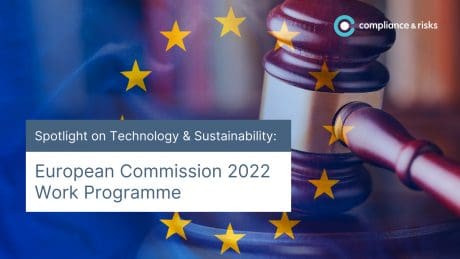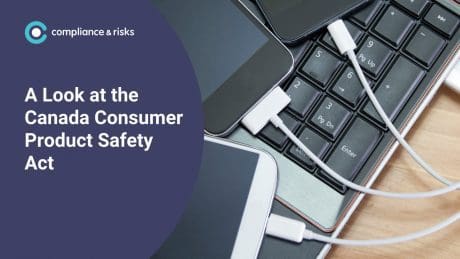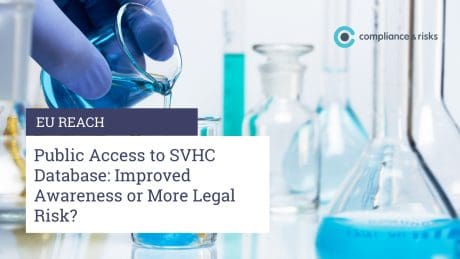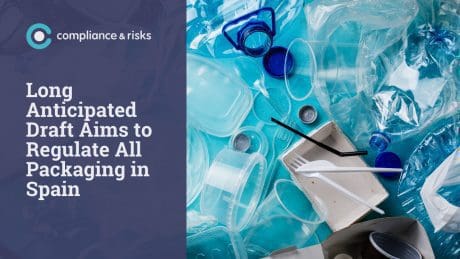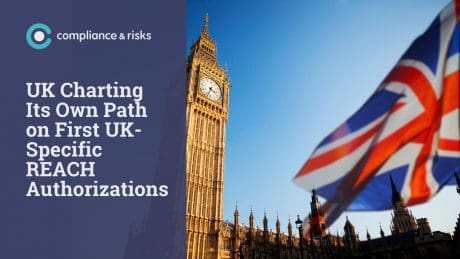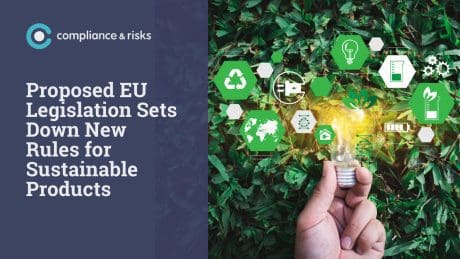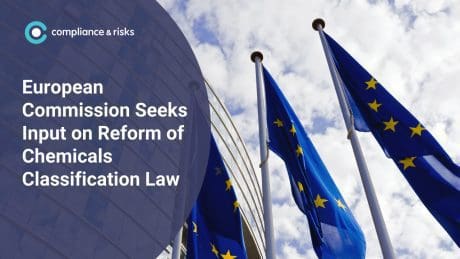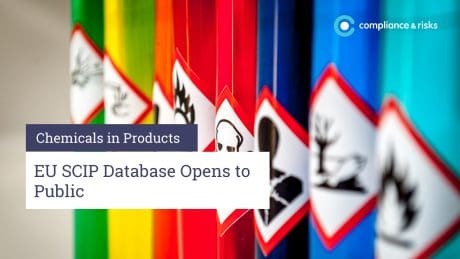
COVID-19 Regulatory Developments: Update 14

The outbreak of the COVID-19 pandemic has resulted in countries adapting their regulatory landscape to accommodate and mitigate the unprecedented disruptions to companies and individuals. Through regular updates, Compliance & Risks will closely monitor the situation and inform our clients of the latest global regulatory developments in relation to COVID-19 relevant to their topics, along with updates on items which may be of interest outside our topics.
Chemicals in Products / Chemicals Management
The COVID-19 pandemic has had a significant impact on the chemicals management industry. To help businesses cope with the consequences of the pandemic, the Japanese Ministry of Economy, Trade and Industry (METI) has extended notification and reporting deadlines for chemicals through the following ordinances:
- Ordinance No. 2 extends the reporting deadline for confirmed new chemical substances to 31 July 2020.
- Ordinance No. 1 amends the so-called Ordinance on the Reporting of Released Amounts of Chemical Substances in the Environment to extend until 31 July 2020 the deadlines for reporting the amount of Class I chemical substances that have been released in the environment and submit requests for changing chemical substance classification name.
- Ordinance No. 57 amends the Chemical Substances Control Law Enforcement Regulations No. 40, 1974 to defer until 31 July 2020 the notification deadline for the following actions: manufacturing of general chemical substances and priority assessment chemical substances (Article 9), monitoring chemical substances (Article 10), and class II specified chemical substances (Article 15) to 31 July 2020.
- Ordinance No. 1 extends until 31 August 2020 the statutory reporting deadline under the Ordinance on Reporting Requirement for the Storage of Mercury, 2015.
These changes entered into force on 12 June 2020.
The Dutch Authority for Biocides announced the extension of timelines for compiling dossiers for biocide substances and products authorizations only in exceptional cases. Postponement of deadlines will not be authorized unless the applicant can “thoroughly substantiate” that delays in submitting biocide dossiers can be attributed to COVID-19.
EH&S: Environment
The U.S. Environmental Protection Agency (EPA) has recently released an addendum to announce the termination of its temporary COVID-19 enforcement policy with effect as of 31 August 2020. The Agency will no longer exercise its discretion in the enforcement of environmental regulations in the event of non-compliance that occurred after 31 August 2020, including non-compliance resulting from COVID-19. The termination addendum allows the EPA to terminate the enforcement discretion policy, in whole or in part, at any earlier time. The EPA shall provide a notification at least seven days prior, if it terminates this temporary policy before 31 August 2020.
The Ontario Government’s Bill 197, also referred to as the COVID-19 Economic Recovery Act, received Royal Assent on 21 July 2020. The Act aims at supporting the economic recovery of the Province and lays down the foundation to “restart jobs and development, strengthen communities, and create opportunity for people in every region of the province“. The Bill amends a number of existing Acts. The most significant changes from a environmental health and safety perspective pertains to the Environment Assessment Act (EAA). Schedule 6 significantly overhauls the Ontario’s environmental assessment program. The COVID-19 Economic Recovery Act will enable the establishment of a Project List to clearly identify the projects and undertakings subject to environmental assessment under the Environmental Assessment Act. The new legislation also enables the adoption of streamlined regulations to replace the existing system of class environmental assessments. These regulations shall establish more consistent requirements for scoping, consultation and documentation thereby improving clarity and certainty for project developers. The Bill also proposes to introduce timelines for environment assessment studies in order to ensure projects are completed in a reasonable time frame. Further changes under the EPA would enable online submissions of environmental assessment applications to enhance transparency and consistency with the EA programs of other provinces and the Federal State. Further information may be found here.
In addition to the amendments to the EAA, the Ministry of the Environment, Conservation and Parks is currently consulting on proposed changes for projects and activities that have requirements under the Class Environmental Assessments (Class EAs) process. Consultation on the proposed amendments to the Class EAs will take place from 8 July to 22 August 2020.
Data Protection
The Norwegian Data Protection Authority notified the National Institute of Public Health of its intention to impose a ban on the processing of personal data by the so-called “Stop Infection” application and asked for a temporary suspension on the collection of personal data from the app. In its response to the Data Protection Authority, the Public Health Institute decided to reject the temporary ban but chose to stop further gathering of personal data and to deactivate the app.
The European Commission amended Implementing Decision (EU) 2019/1765 as regards the cross-border exchange of data between national contact tracing and warning mobile applications in the context of COVID-19. In April 2020, the European Commission adopted a Recommendation on a common Union toolbox for the use of technology and data to combat and exit from the COVID-19 crisis. Shortly after that, the Member States participating in the eHealth Network developed a Common EU toolbox on mobile applications to support contact tracing as well as interoperability guidelines for approved contact tracing mobile apps. In order to facilitate the interoperability of national contact tracing and warning mobile applications, a digital infrastructure was also developed as an IT tool to exchange data between Member States. In light of the foregoing developments, this decision lays down the regulatory framework and modalities for the cross-border exchange of data between designated national authorities or official bodies through the IT infrastructure, also referred to as “the federation gateway”. For further information, please refer to the Commission’s Implementing Decision (EU) 2020/1023.
Product Safety
The offices and laboratories of Argentine Ente Nacional de Comunicaciones (ENACOM) will remain closed until 2 August 2020 (inclusive) as a result of remote working and limited operation. The validity of approval certificates which are due to expire between 16 March 2020 and 30 June 2020 will be extended for a period of 60 calendar days. The announcement can be found on ENACOM’s official website.
Occupational Health and Safety
The Swedish Work Environment Authority has set out a dedicated webpage providing advice on reducing the risks of COVID-19 transmission in the workplace. The webpage will be used to disseminate information on how to investigate and assess risks of infection within the workplace and assist employers with developing in-house action plans. It also provides tips on specific protective measures that may be taken to reduce such risks. This information is based on the provisions of regulation AFS 2018:4 on Infection Risks.
The Finish Institute of Occupational Health updated a series of guidelines for employers to support safe returning to work: Guidelines for Workplaces to support returning to work.
In Ontario, the City Councils of Toronto and Ottawa passed a temporary by-law requiring residents to wear face masks in enclosed public places and business premises with effect from 7 July 2020. Employers are expected to implement face mask policies and to communicate these policies to staff members. Employers shall prohibit the public from entering their premises without appropriate face coverings protecting the nose, mouth, and chin.
- City of Toronto, By-Law 541-2020
- City of Ottawa, Ottawa: Instruction from Medical Officer of Health to business owners and operators
- City of Ottawa: Temporary Mandatory Mask By-law No. 2020-186
Other provinces have taken similar measures. The wearing of face masks has been made mandatory since 18 July 2020 in places that welcome the public in Quebec. The Order in Council 810-2020 specifies that places affected by the requirement include, among other things, retail businesses, shopping centers, or buildings or premises where a service business is carried on. Face coverings include a mask or a tight-fitting cloth that covers the nose and mouth.
The Ontario Ministry of Labour provided employers with a general guide to help them develop COVID-19 workplace safety plans. The guide includes recommendations to reduce transmission risks in the workplace and includes a template of a workplace safety plan to assist employers with this process. The guide stresses that while face coverings shall be advised, face masks are not an appropriate substitute for physical distancing in the workplace.
In this respect, the Ontario Ministry of Labour has reminded employers that they shall notify the Ministry in writing within four days if an employee has contracted COVID-19 within the workplace. Notification shall be sent addressed to “Attention: Director” and emailed to MLTSDoccillness.notices@ontario.ca or mailed or faxed to the Ministry of Labour, Training, and Skills Development regional office closest to the workplace. Notice should also be given to the workplace joint health and safety committee, health and safety representative and trade union, if applicable.
At the Federal level, a Bill establishing further COVID-19 measures has been introduced for consideration in the Canadian Parliament. The proposed legislation revises the eligibility criteria for the Canada Emergency Wage Subsidy (CEWS) scheme in order to support those employers hardest hit by COVID-19. It also extends the CEWS to 21 November 2020, and provides for the ability to further extend the CEWS by regulation to no later than 31 December 2020. A revised calculation method is introduced for the fifth and subsequent qualifying periods.
In the United States, the Occupational Safety and Health Administration (OSHA) has updated and consolidated the frequently asked questions and answers for employers in relation to mandatory face mask policies within the workplace.
California introduced a Bill that requires employers to notify the staff and the Division of Occupational Safety and Health of any exposure to COVID-19 in the workplace that “the employer knew of or should have reasonably have known of”. Notification shall also be submitted to the State Department of Public Health. The Bill further provides a series of steps to be taken by the employer in case of employees’ exposure to COVID-19. Californian employers shall provide face coverings for workers or reimburse them for the reasonable costs of obtaining them.
The UK Government updated its Occupational Health & Safety Guidance for Construction and other Outdoor Work, Factories, Plants and Warehouses, Offices and Contact Centers in order to reflect the change to the 2m rule for social distancing, and added further guidance on mass gatherings in the workplace. As discussed in our previous update, HSE issued additional guidance to help employers manage and assess the risks associated with re-starting or running businesses during the outbreak. HSE recalls that it is the employer’s responsibility to protect their employees and to carry out a risk assessment. HSE has made available templates and examples of risk assessments performed by other businesses. Additionally, HSE published useful resources on practical measures to implement including social distancing, hygiene and face mask policies, to prevent the transmission of the virus in the workplace. Detailed guidance for larger and higher risks may be found here.
The French Ministry of Labour has recently released a National Protocol for Businesses Re-opening their premises to ensure the protection of employees in the aftermath of COVID-19.
Medical Supplies and PPE
The U.S. Environmental Protection Agency (EPA) has approved the first two surface disinfectant products and updated the List N to show they have been successfully tested against the agency’s criteria as products for use against COVID-19. The products concerned are Lysol Disinfectant Spray (EPA Reg No. 777-99) and Lysol Disinfectant Max Cover Mist (EPA Reg No. 777-127). These are the first disinfectant products for which the agency has reviewed laboratory testing data and approved label claims against COVID-19.
On 13 July 2020, the UK’s Medicines and Health Care Products Regulatory Agency (MHPRA) released guidance to inform the industry about possible regulatory flexibility envisaged by MHPRA for medicines and medical devices.
MHPRA also issued a list of manufacturers and devices subject to exceptional use authorizations. Medical devices granted an exceptional use authorization can be sold to the NHS and within the social care sector to ensure a continued supply of medical devices. The list will be reviewed every week to reflect any new, withdrawn, and expired authorizations.
On 8 July, Health Canada published a safety alert after identifying counterfeit N95 respirators and advised Canadian consumers to stop using them as they may not offer appropriate protection against COVID-19.
South Korea issued a Notice with regard to the control of face masks in order to ensure sufficient domestic supply of PPE. The Notice maintains restrictions on export and introduces reporting obligations for manufacturers. Manufacturers of face masks in the country are expected to report information on their production, export, and stock volumes and weekly production plans to the Food and Drug Administration on a monthly basis.
China notified the WTO that the implementation of national standard GB 2626-2019 “Respiratory protection – Non-powered air-purifying particle respirator”, initially scheduled for application as of 1 July 2020, will be delayed to 1 July 2021 in order to avoid disruption to the supply of respirators. Businesses may choose to implement either the new or current version during the transitional period.
China further announced amendments to the requirements relating to the examination of application files and registration of medical devices. The first amendment relates to the procedure to be applied by the Center for Medical Device Evaluation of China (CMDE) for reviewing supporting documentation in the registration of imported devices. The second amendment gives the CMDE the possibility to withdraw certain imported class-II medical devices from the registration process if the examination of documentation reveals that the product should have been categorized as a class 3 medical device. The applicant should fill out a new application and provide documentation that clearly indicates that the product was previously withdrawn from the registration process. For further details, please consult amendments No.16/2020 and No. 17/2020.
The U.S Food and Drug Administration (FDA) released its final guidance, Review and Update of Device Establishment Inspection Processes and Standards, outlining how the Agency will implement uniform processes and standards for inspection of foreign and domestic medical devices establishments.
The FDA considers harmonizing its Quality System Regulation under 21 CFR Part 820 with the International standard ISO 13485:2016 on quality management systems for medical devices. The Agency stressed that the revision of the Quality System Regulation is intended “to promote the use of more modern risk management principles and reduce regulatory burdens on device manufacturers and importers by harmonizing domestic and international requirements“. Further details may be found in the FDA’s Agenda Rule List.
A new rule is also being prepared by the FDA to establish more transparent and predictable requirements for manufacturers filling up a De Novo application for new medical devices. “By clarifying and making more efficient the De Novo request requirements, [the FDA] expects the rule would reduce the time and cost associated with reviewing De Novo requests and generate net benefits in the form of cost savings”.
Ontario is continuing all emergency orders adopted under the Emergency and Civil Protection Act. Continued orders will cease to apply after 30 days but can be extended by the Lieutenant Governor in Council for additional periods of up to 30 days. Bill 195, titled Reopening Ontario (A Flexible Response to COVID-19) Act 2020, received Royal Assent on July 21 and entered into force on 24 July 2020. The list of emergency orders enacted may be found on the Ontario e-law website under the Emergency and Civil Protection Act.
